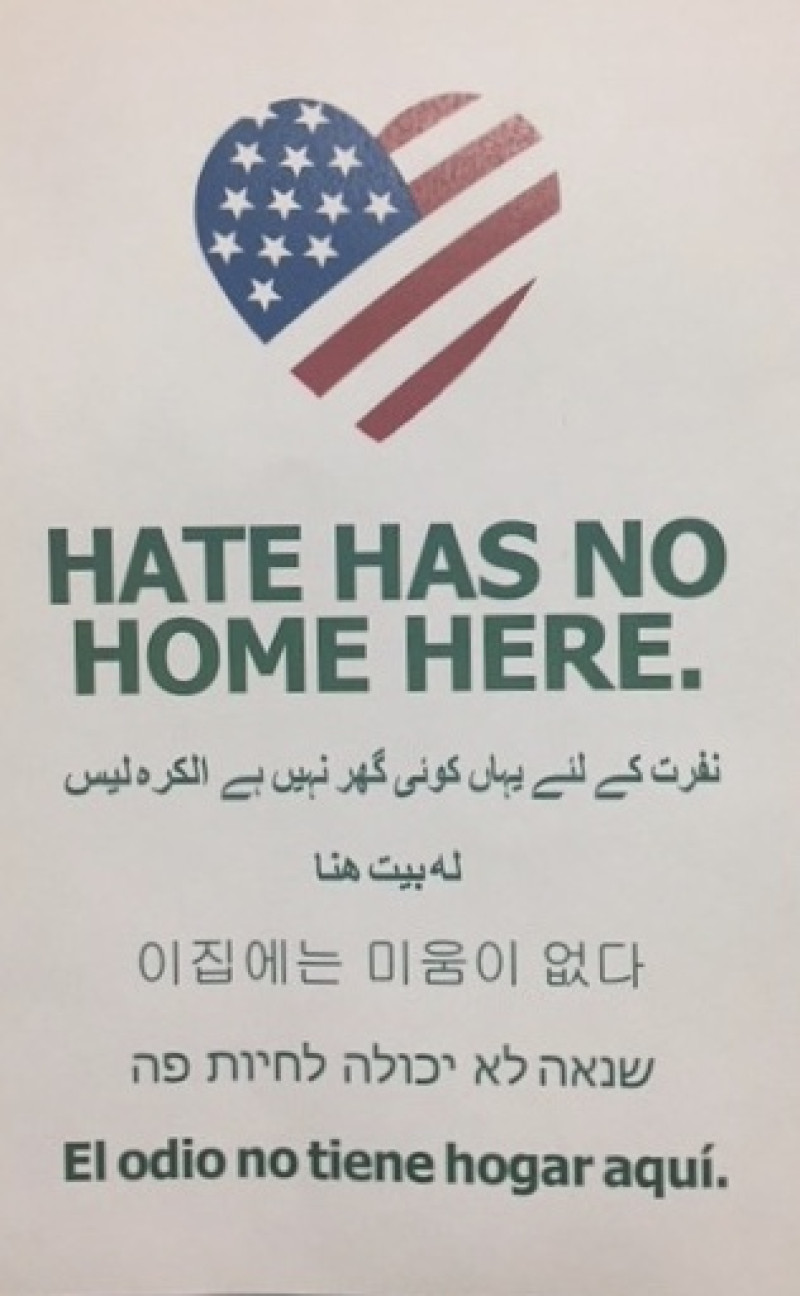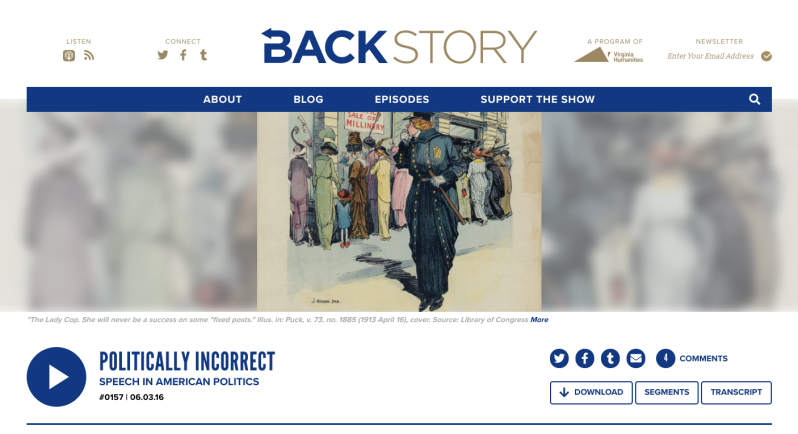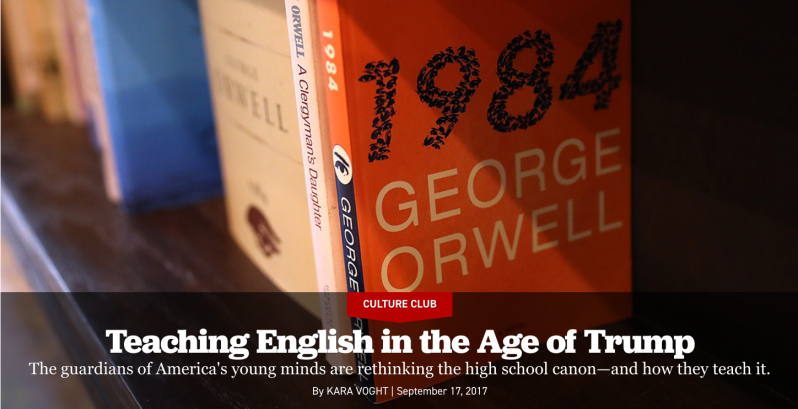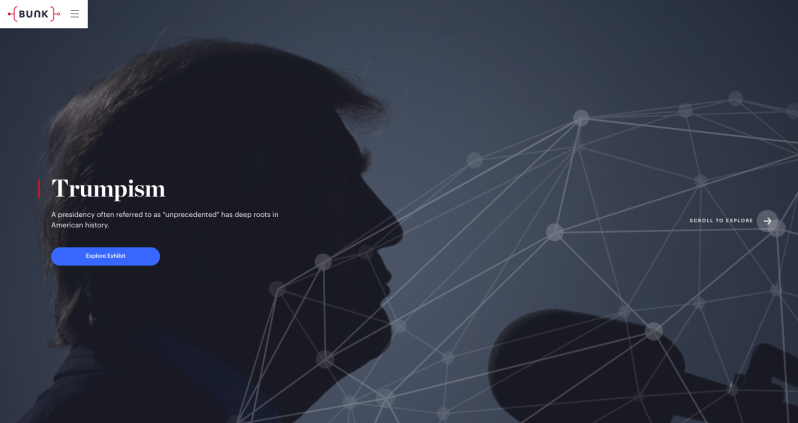This work by New American History is licensed under a Attribution-NonCommercial-ShareAlike 4.0 (CC BY-NC-SA 4.0) International License. Permissions beyond the scope of this license may be available at newamericanhistory.org.
Teaching in the Age of Trump
View Student Version
Share this page with your students.
Standards
Council for Accreditation of Educator Preparation (CAEP)
Standard 1. Content and Pedagogical Knowledge The provider ensures that candidates develop a deep understanding of the critical concepts and principles of their discipline and, by completion, are able to use discipline-specific practices flexibly to advance the learning of all students toward attainment of college- and career-readiness standards. Candidate Knowledge, Skills, and Professional Dispositions
1.1 Candidates demonstrate an understanding of the 10 InTASC standards at the appropriate progression level(s) in the following categories: the learner and learning; content; instructional practice; and professional responsibility.
Teacher Tip: The resources provided here help create an open and honest dialogue amongst pre-service teachers, college university faculty, and K12 educators. They may be used in whole or as part of an online or face to face professional learning community (PLC) module. It may help if participants create Group Norms before using these learning resources.
- Suggested Audience: Pre-service Educators/K-16 Educators & PLCs
- Suggested Timeframe: Two 90 minute sessions, or four 45 minute sessions.
- Suggested Materials: Internet access via laptop, tablet or mobile device
Key Vocabulary
- Trumpism - nontraditional political philosophy and approach embraced by US President Donald Trump and his supporters.
- Civil Discourse - participation in a conversation for the purpose of increasing understanding, possibly establishing middle ground or finding ideas which we hold in common, rather than focusing on points of disagreement with others participating in the discussion.
Read for Understanding
As educators look towards teaching civics, government and history during contentious election seasons, this New American History Learning Resource takes a look at the increasing challenges educators face when trying to stay neutral and continue to teach topics such as elections, the electoral college, branches of government, patriotism, respect for the office of the president (and other elected officials), and especially civil discourse/civility. This has been especially challenging for teachers, as well as parents, since the 2016 elections. Many K-12 educators who are working with minor students face greater scrutiny from parents on both ends of the political spectrum who are quick to react if they believe the teachers’ implicit biases are evident in their instruction.
Teacher Tip: We welcome your comments, as well as suggestions for additional resources or ideas which we might include to further this discussion. Please feel free to add your thoughts and contributions to this and all of our Learning Resources using our feedback links at the end of each resource.
This Learning Resource includes language in the body of the text to help adapt to a variety of educational settings, including remote learning environments, face-to-face instruction, and blended learning.
If you are teaching remotely, consider using videoconferencing to provide opportunities for students to work in partners or small groups. Digital tools such as Padlet or Jamboard may also be used for collaboration.
These Learning Resources use the Jigsaw strategy and the Kagan Three-Step Interview strategy for small group exercises.
These Learning Resources follow a variation of the 5Es instructional model, and each section may be taught as a separate learning experience, or as part of a sequence of learning experiences. We provide each of our Learning Resources in multiple formats, including web-based and as an editable Google Doc for educators to teach and adapt selected learning experiences as they best suit the needs of your students and local curriculum. You may also wish to embed or remix them into a playlist for individuals working remotely or independently.
View Bunk exhibit: Trumpism
A presidency often referred to as "unprecedented" has deep roots in American history.
Engage:
How have we amended or expanded our definition of “political correctness” since the 2016 elections?
Even prior to the final 2016 election results being certified, the parameters of political correctness were being reexamined and redefined in ways not previously explored in earlier election cycles. This pre-election episode of BackStory tackled this issue and may help start a dialogue amongst pre-service and K-16 educators, school leaders, and community members. Ask participants to listen to the podcast prior to the pre-service educator lesson or K-12 PLC meeting.
Listen to BackStory episode
"Politically Incorrect: Speech in American Politics"
Once all participants have had an opportunity to listen to the Backstory episode, "Politically Incorrect: Speech in American Politics," conduct a discussion considering the following:
- Reflecting back now in the post-election years, does the podcast content resonate?
- How might we rethink some of these ideas in hindsight?
- What ideas or insights from the podcast do you agree or disagree with the most?
You may wish to use a reflective journal or digital discussion forum (Backchannel) if not meeting in a smaller face-to-face PLC, or with a larger class or in-service professional learning setting or online module, to ensure equity of voice.
Explore:
What challenges do educators face today while teaching in the Age of Trump?
The Southern Poverty Law Center conducted a survey during the spring of 2016 via their educational publication, Teaching Tolerance, to address growing concerns amongst educators about the impact of the 2016 presidential campaign on students of color and students from immigrant families. Coined The Trump effect, the survey and results can be found online.
Post-election concerns grew as reports of increased incidents of racial bias and stereotyping grew, prompting some school divisions to institute new policies for hate speech and civil discourse amongst students, teachers and the community. This article from City Lab discusses a high school in Maryland where a new required course in civil discourse was created to address these concerns.
Use the jigsaw strategy as a means of exploring these resources in small groups either as part of a pre-service education course, in-service learning module or PLC. Access directions for the jigsaw strategy.
- How might the Trump Effect survey, Community Citizenship course or other resources shared be integrated into your future or current teaching practices?
- What policies, if any, are in place at your current educational institution to ensure instruction remains non-partisan while still remaining true to the fundamental principles of democracy?
- What local examples might you share as they pertain to this dialogue?
- What concerns do you have about teaching in the current political climate?
You may wish to use a reflective journal or digital discussion forum (Backchannel) if not meeting in a smaller face-to-face PLC, or with a larger class or in-service professional learning setting or online module, to ensure equity of voice.
Explain:
Is the Trump Effect only impacting our K-12 history, civic and government classes, or is this a whole school and community-wide issue?
The teaching and learning of democratic principles are not the sole responsibility of social science educators. Much of what we teach and learn ourselves about what it means to be an American, and how we view the American Dream, is influenced by the fiction and nonfiction literature we read both in and out of schools, and how we are taught to be consumers of print and online media. In many cases, the library media specialists and English teachers might be the greatest ally in supporting efforts to eradicate stereotypes and implicit biases in the overall schoolwide curricula and learning resources.
Consider this article from Politico: Does it still resonate after the 2020 presidential elections?
Working in groups of three, discuss the following questions using the Kagan Three-Step Interview strategy:
- Think back to the books or novels you read as a K-12 student. Which titles, if any, held your attention or did you feel a connection to the characters or story the most? Describe these connections if possible.
- Did you ever experience a time in your K12 schooling where you were made to feel uncomfortable about a reading passage or novel study you were required to read? How did you navigate this situation as a learner?
- Were there other books you read/discovered outside the traditional classroom or later in life which continue to influence your thinking about your own identity, or about people from other racial, ethnic, religious or cultural groups? Have any of these stories been incorporated into your previous or current teaching practice?
- What process or policies does your school or division have for selecting, approving or “retiring” reading materials when selecting the best resources for students?
- What suggestions might you make to improve or update these policies?
You may wish to use a reflective journal or digital discussion forum (Backchannel) if not meeting in a smaller face-to-face PLC, or with a larger class or in-service professional learning setting or online module, to ensure equity of voice.
View Bunk exhibit: "Trumpism"
A presidency often referred to as "unprecedented" has deep roots in American history.
Elaborate:
Can we help our students, colleagues, and communities find the middle ground by teaching and modeling civil discourse in our classrooms?
- What themes emerge which you have or anticipate you will have some level of concern navigating in your current or future teaching practice?
- What resources from this learning resource or other resources you have explored might best help address these topics in your school or classroom? (Please consider sharing new resources using the feedback links at the end of this learning resource!).
As a final reflection, please view this brief video featuring Meg Heubeck from the Youth Leadership Initiative, on the power of teaching and modeling Civil Discourse in our classrooms.
Lesson Extension
Preservice teachers may create their own “I am an American” video to illustrate their views on civil discourse, or K-16 teachers may assign this as a classroom activity using some of the activities within this learning resource as they are age-appropriate.
- What other strategies might we employ to help our colleagues make that move “over the mountain?”
- What does it mean to "be an American" in the 21st century?
You may wish to use a reflective journal or digital discussion forum (Backchannel) if not meeting in a smaller face-to-face PLC, or with a larger class or in-service professional learning setting or online module, to ensure equity of voice.
Download this learning resource on Google Docs
Citations:
Aronson, Elliott. “OVERVIEW.” The Jigsaw Classroom. Social Psychology Network, 2019. https://www.jigsaw.org/.
Cox, Janelle. “Teaching Strategies: The Three-Step Interview.” TeachHUB. K-12 Teachers Alliance. Accessed 12AD. https://www.teachhub.com/teaching-strategies-three-step-interview.
“'I Am an American'.” USA Today. Gannett Satellite Information Network, December 31, 2016. https://www.usatoday.com/videos/news/2016/12/31/'i-am-american'/96032264/.
Kirk, Mimi. “Teaching Civility in the Age of Trump.” CityLab. Atlantic Monthly, December 18, 2017. https://www.citylab.com/life/2017/12/teaching-civility-in-the-age-of-trump/548462/.
“Trumpism.” Bunk History. Bunk History, n.d. https://www.bunkhistory.org/exhibits/5.
Voght, Kara, Juleanna Glover, Jeff Greenfield, and Alexandra Glorioso. “Teaching English in the Age of Trump.” POLITICO Magazine. POLITICO Magazine, September 17, 2017. https://www.politico.com/magazine/story/2017/09/17/teaching-high-school-english-in-the-age-of-trump-215611.





